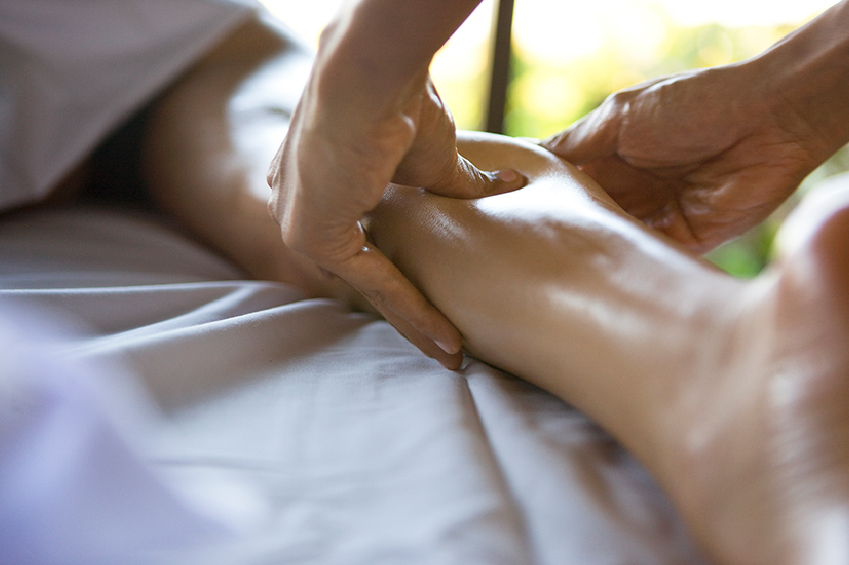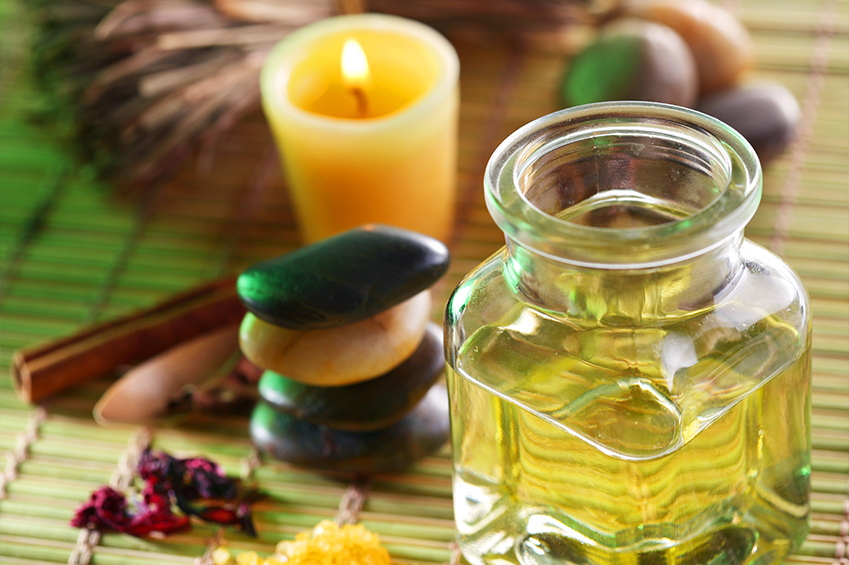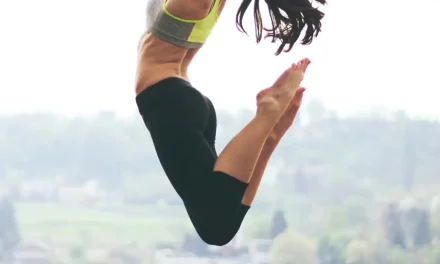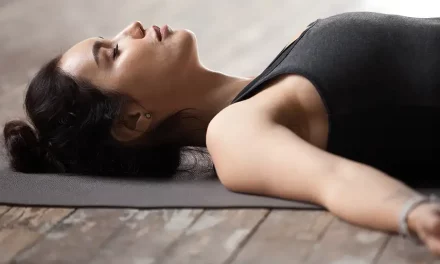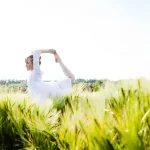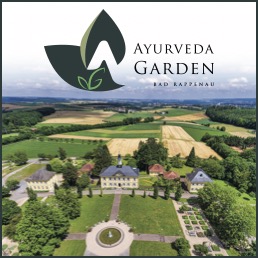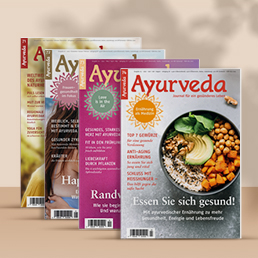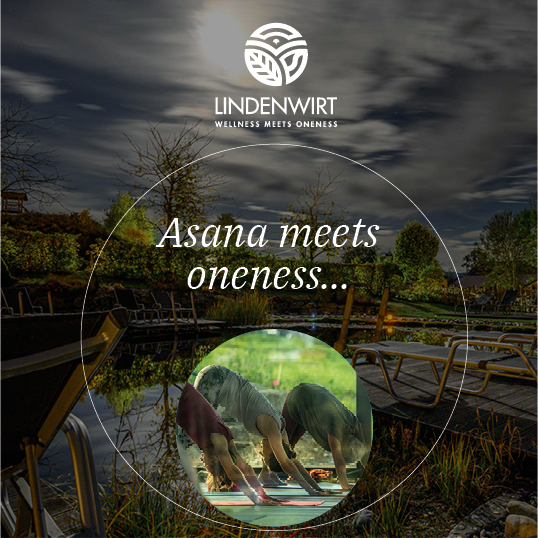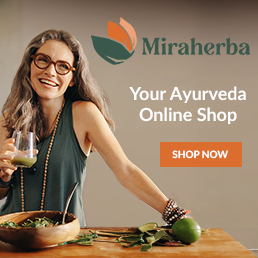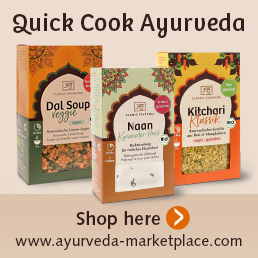Abhyanga – the ayurvedic full body massage
It is the epitome of pleasurable relaxation: the Abhyanga. Performed with warm herbal oils, the full-body massage is one of the most beneficial and effective forms of treatment in Ayurvedic health teachings. It harmoniously combines several techniques that serve to deeply relax and vitalize the body. It is not for nothing that Abhyanga in ancient Indian means “oiling with loving hands”. The high-quality oils penetrate deep into the skin and are valuable for a healthy complexion. In addition, the gentle touches are a very effective way to clear the mind. In short: an Abhyanga is simply an enriching experience.
Abhyanga full body oil massages are offered throughout Europe in a wide variety of establishments: in hotels, wellness facilities, practices for holistic treatments or by Ayurvedic doctors, alternative practitioners and Ayurvedic therapists. They are an important part of Ayurveda therapies like the Panchakarma for example.
Even for the Ayurveda practitioner there are always touching moments. This is what happened to me recently when a woman redeemed her gift certificate for an Abhyanga. It was the first time she received an Ayurvedic full body massage. And at the end of the massage, she whispered in amazement, “I never knew I had so much body!” These are moments that make us massagers feel happy and grateful.
A valuable tip for the more Vata-emphasized people
If you start Ayurvedic full body massages in fall and enjoy them regularly through the winter, you can be more stable, joyful and strong through the wet and windy season.
The tradition of doing Abhyanga massage in Ayurveda
“My hand is God. Boundlessly blissful is my hand. This hand keeps all secrets, making whole with its gentle touch.”
Even these words from the Rigveda, which is one of the most important scriptures of Hinduism and is considered the oldest book in the world, indicate the intense effect of Abhyanga treatments.
Abhyanga literally means “a special movement around something”. In Ayurveda, oilings are called “Snehana“. A distinction is made between internal oiling (Abhyantara) and external oiling (Bhahya Snehana). “Ang” means movement. “Abhi” means external or around. Abhyanga is divided into mardana (pressure massage) and samvahana (light, gentle massage).
The oilings (snehana) are much more than just oiling the skin. The German word “Schnee” (snow) has the same Indo-Germanic root as the Indian word Snehana. Just as freshly fallen snow nestles around a tree, just as snow gently envelops and wraps everything lacy, uneven, leaving nothing in disarray, so lovingly should the hands of the Ayurvedic therapist wrap themselves around the client’s body with the oil, the snehana.
The effect
The Abhyanga full body massage relaxes, strengthens the immune system, has a rejuvenating effect and overall has a kind of purifying and liberating effect. Everyone who enjoys an Abhyanga, whether performed by one or two Ayurvedic therapists, immediately feels how intensely these oil massages work. Whereby there is not the one Abhyanga. I have never received the same abhyanga during my previous Ayurvedic study visits to India, no matter where I have been. Depending on the traditional and local origin, different massage strokes are emphasized, sometimes the abhyanga is more dynamic and pressured.
How to apply the oil
In the classic Abhyanga two stroking directions are used. There is “Anuloma”, a stroking with the hair direction, which has a rather calming and balancing effect. The other variant is “Pratiloma”, a stroking against the direction of the hair, which has a more stimulating and invigorating effect. The Ayurvedic therapist differentiates depending on the client and the purpose of the massage.
The indications and contraindications
Classic indications for Abhyanga
- In case of dosha imbalance, especially of Vata (the principle of movement).
- People who do intense physical exercise every day, such as athletes
- With a lot of mental work
- In geriatrics, as a rasayna (rejuvenator)
- To promote the regeneration of tissues and organs
- To relieve stress
Classic contraindication for Abhyanga
- Cold with strong mucus
- Directly after a purifying treatment, such as the Pancha Karma cure (Ayurvedic cleansing cure)
- Acute fever
- When food is not yet fully digested
- Very weak clients, severe fatigue
- Strongly blocked shrotas (body channels) caused by ama (undigested food)
- Inflammatory skin diseases
The importance of oil in Abhyanga
The oil nourishes the cells and the organs, removes waste products from the tissues, and the perception of the body increases significantly.
For an abhyanga, different oils are used and selected by the Ayurvedic therapist depending on the constitution and indication. For example, sesame oil (heating), olive oil as well as coconut oil (cooling) can be used as body oil for preventive purposes.
Sesame oil plays a significant role, because it has a high penetration power, so it can penetrate very deeply through the tissue and adequately supply it. It is not called for nothing: open sesame!
The cooling and fragrant properties of rose oil or almond oil beguile the client during the facial massage during Abhyanga.
The face and the head as a whole are always treated “cooling” in Ayurveda, so that no heat is generated in the head.
The special types of oil
In Ayurveda, medicated oils, Thailams, are used for all applications. Oil massages are a kind of phytotherapy for the skin, so to speak. The production of herbal oils is very time and material consuming. In India, the oils for Abhyanga are often produced on site in the Ayurvedic hospital, in their own pharmacy, from their own medicinal herb garden – and this can sometimes take days.
Care must be taken to ensure that the oils are of high quality, otherwise they have no therapeutic value. Special medicated oils, individually adjusted to the patient, account for up to 70 percent for the quality of a treatment, while the therapist accounts for about 30 percent.
Three typical medicated oils in Ayurveda
- Mahanarayan Thailam, an oil that has anti-inflammatory, analgesic and nourishing effects on the various dhatus (tissues). It is used for stiffness of the joints, tendonitis, rheumatic diseases. In short, one of the most impressive oils for various ailments of the musculoskeletal system. In addition, wonderfully suitable as a whole-body oil for Abhyanga for Vata or Vata imbalance.
- Pinda Thailam, an oil that has a cooling and blood purifying effect. It is used when there is too much heat in the body and disorders of skin metabolism. Pinda Thailam is used for Pitta or Pitta imbalance.
- Shulahara Thailam, an oil that contains camphor and mustard oil, among others, and has a purifying, metabolism-stimulating and heating effect. Good for slagging, cellulite, sluggishness or muscle tension. To be used in Kapha constitution or Kapha disorders.
Which oil is used when and how will be decided by a competent Ayurvedic therapist in a personal consultation before an Abhyanga.
Features of an authentic Ayurveda Abhyanga
Professionally trained Ayurvedic therapists usually clarify some important points before the actual massage:
- Are you allergic to anything?
- Have you had surgery in the past six months?
- Are you pregnant?
- Are you currently menstruating?
He performs the full body massage with carefully selected oil, tunes the pressure, rhythm, duration of the massage, aftercare and last but not least the tips entirely to your individual constitution and current condition. The therapist should also inform about possible reactions.
After the Abhyanga tips are important so that the balance gained is also maintained
- do not walk barefoot
- protect yourself from drafts and wind
- cover your head
- do not eat rich food and do not do extreme activities after the massage
- drink hot ginger water
There are many good reasons for an Ayurvedic full body massage. It can help very well with back problems, tension, stress, allergies and severe headaches. All in all, the Abhyanga is not only healthy and useful – but simply pure pleasure. In every situation of life!
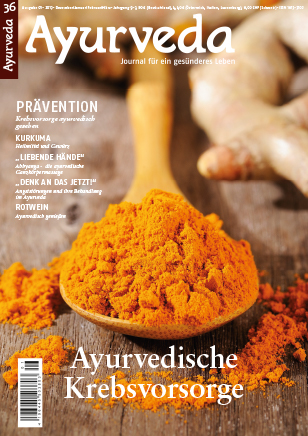
Issue 36 – Cancer Prevention
This issue not available anymore.

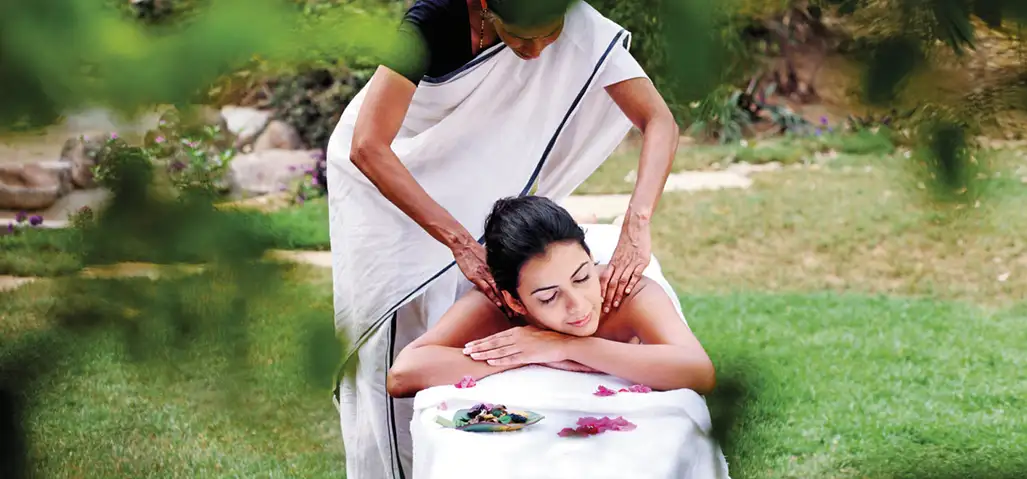 © Visage / Getty Images
© Visage / Getty Images 